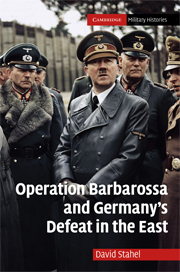Book contents
- Frontmatter
- Contents
- List of Illustrations
- List of Maps
- Acknowledgements
- Glossary of terms
- Tables of military ranks and army structures
- Introduction
- Part I Strategic plans and theoretical conceptions for war against the Soviet Union
- Part II The military campaign and the July/August crisis of 1941
- 5 Awakening the bear
- 6 The perilous advance to the east
- 7 The battle of Smolensk
- 8 The attrition of Army Group Centre
- 9 In search of resurgence
- 10 Showdown
- Conclusion
- Bibliography
- Index
- References
9 - In search of resurgence
Published online by Cambridge University Press: 05 April 2013
- Frontmatter
- Contents
- List of Illustrations
- List of Maps
- Acknowledgements
- Glossary of terms
- Tables of military ranks and army structures
- Introduction
- Part I Strategic plans and theoretical conceptions for war against the Soviet Union
- Part II The military campaign and the July/August crisis of 1941
- 5 Awakening the bear
- 6 The perilous advance to the east
- 7 The battle of Smolensk
- 8 The attrition of Army Group Centre
- 9 In search of resurgence
- 10 Showdown
- Conclusion
- Bibliography
- Index
- References
Summary
The arduous road to renewal
In his first letter to the Soviet leader after the beginning of Barbarossa, Churchill informed Stalin of his unreserved commitment to the Soviet war effort. After praising the Red Army's ‘strong and spirited resistance’, Churchill then promised; ‘We shall do everything to help you that time, geography and our growing resources allow. The longer the war lasts the more help we can give.’ On 30 July Roosevelt's special representative, Harry Hopkins, met with Stalin in Moscow to discuss US assistance to the Soviet Union. Hopkins reported that Stalin was optimistic about the progress of the war and believed that a continued German offensive would be difficult in September and not possible by October when the heavy rains would begin. Thus, it was not 1941 that worried Stalin, indeed Hopkins remarked on Stalin's ‘great confidence’ that the Soviets would hold through the winter. Stalin was more concerned about the coming spring when mobile operations would again be possible. For this he wanted steel for more Soviet tanks and he also expressed his desire to purchase as many American tanks as possible. Additionally, he requested aluminum for aircraft construction, anti-aircraft guns, machine guns and rifles. The list would be added to in September at the follow-up Three-Power conference in Moscow, attended by Lord Beaverbrook for the UK and Averell Harriman for the USA. The Three-Power conference agreed on urgent support for the USSR, even at the expense of reinforcing other theatres, and thereafter increasingly voluminous supplies began to flow, initially via Nordic convoys and the Far East (Vladivostok), but later also overland through Persia. Indeed, during the period of the First Protocol, running from October 1941 to June 1942, the British and Americans undertook to ship some 400 aircraft, 500 tanks and 10,000 trucks each month, as well as a wide range of other supplies. These targets were met, but a significant proportion of these supplies were lost en route as German air and naval forces from northern Norway attempted to cut access to Murmansk and Arckangel'sk.
- Type
- Chapter
- Information
- Operation Barbarossa and Germany's Defeat in the East , pp. 361 - 422Publisher: Cambridge University PressPrint publication year: 2009



